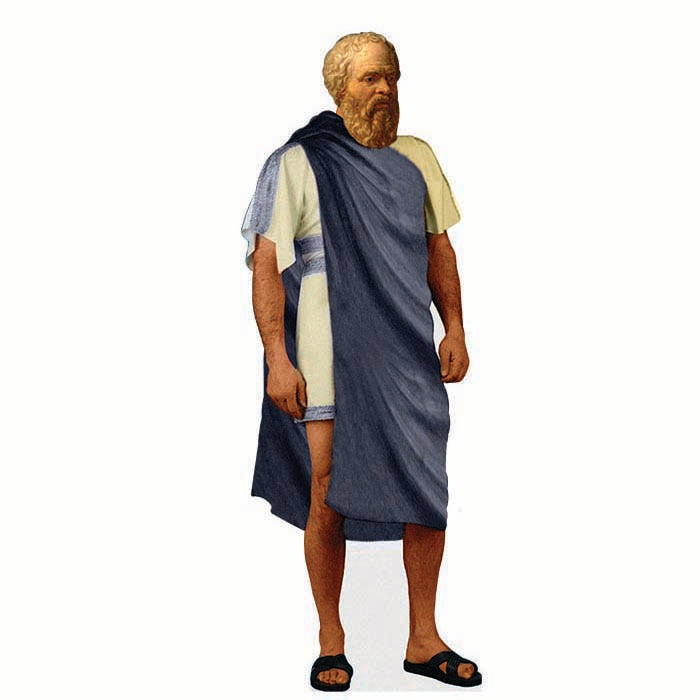Introduction to Philosopher Socrates
Celebrate the legacy of one of the greatest philosophers in history with our lifesize cardboard cutout of Socrates. Perfect for philosophical displays, educational events, or as an inspiring addition to your home or office, this cutout captures the profound and influential presence of Socrates, reflecting his significant impact on philosophy and culture.
Background of Philosopher Socrates
Socrates was born around 470 BCE in Athens, Greece, to a stonemason father, Sophroniscus, and a midwife mother, Phaenarete. Little is known about his early life and education, but he eventually became a prominent figure in Athenian society through his unique approach to philosophy.
Unlike many philosophers of his time, Socrates did not write down his teachings. Instead, his ideas and methods were recorded by his students, most notably Plato. Socrates is best known for his method of dialectical questioning, commonly referred to as the Socratic Method. This technique involved asking a series of probing questions to stimulate critical thinking and to illuminate ideas. Through this method, Socrates sought to uncover underlying beliefs and assumptions, encouraging his interlocutors to arrive at their own conclusions.
Socrates believed in the pursuit of virtue and knowledge, asserting that an unexamined life was not worth living. He often engaged in public debates, questioning the ethical and philosophical beliefs of his fellow Athenians. His focus on ethical questions and the nature of virtue set him apart from the pre-Socratic philosophers, who were more concerned with cosmology and the nature of the physical world.
Socrates' unconventional methods and his tendency to challenge established norms eventually led to his trial in 399 BCE. He was accused of corrupting the youth of Athens and impiety, charges that he denied. Despite his eloquent defense, Socrates was found guilty and sentenced to death. He chose to accept the verdict and was executed by drinking a cup of poison hemlock.
Socrates' death had a profound impact on his students and the philosophical world. His life and teachings, as recorded by Plato and others, have continued to influence philosophical thought and ethical inquiry for over two millennia.
Cultural Impact of Philosopher Socrates
Socrates' impact on philosophy and culture is profound and enduring. He is often regarded as the father of Western philosophy, and his methods and ideas have shaped the course of philosophical thought.
The Socratic Method, characterized by rigorous questioning and dialogue, remains a fundamental technique in education and philosophical inquiry. This method encourages critical thinking, self-reflection, and the pursuit of truth, principles that are central to the humanities and social sciences. The Socratic Method is widely used in law schools, classrooms, and intellectual discussions, fostering an environment where ideas can be examined and refined.
Socrates' focus on ethics and virtue laid the groundwork for subsequent philosophical exploration of moral philosophy. His belief that knowledge and virtue are intrinsically linked has influenced ethical theories and practices throughout history. Philosophers such as Plato, Aristotle, and the Stoics built upon Socratic ideas, developing comprehensive ethical systems that continue to be studied and debated.
Socrates' life and death have also had a significant cultural impact. His commitment to his principles, even in the face of death, has made him a symbol of intellectual integrity and moral courage. His willingness to question authority and challenge societal norms has inspired countless thinkers, activists, and leaders to pursue truth and justice, often at great personal risk.
The trial and execution of Socrates have been interpreted as a turning point in the relationship between the individual and the state. His death highlighted the tension between freedom of thought and the demands of society, a theme that remains relevant in contemporary discussions about civil liberties, free speech, and political dissent.
Socrates' influence extends beyond philosophy to literature, art, and popular culture. His character has been depicted in numerous works of literature, drama, and film, often embodying the quest for wisdom and the struggle against ignorance and injustice.
This cutout of Socrates celebrates his remarkable contributions and enduring legacy as a master philosopher. It serves as a tribute to his intellectual brilliance, his impact on the development of Western philosophy, and his significant role in shaping the cultural and intellectual heritage of the Western world.

LIFE SIZE HISTORICAL CUTOUTS
We have been the leading historical based cutout supplier for nearly 10 years. We have worked with many schools, museums, and colleges across the country to provide stunning graphics from history. Historical Cutouts are available in 3 materials and come contour cut with an easel to be self standing. Click below to learn more about each material and our cutout process.

LIFE SIZE HISTORICAL WALL DECALS
All of our historical figures are available as a life size wall decals. Vinyl wall decal orders come ready to apply with squeegee and instructions. Having trouble? Check out our how-to YouTube video. Our graphics are printed on tear resistant PhotoTex Vinyl using our high definition 4-color plus white printing process.

HISTORICAL ACRYLIC CUTOUTS
Desktop Legends are a smaller version of our life size cutouts printed on 3/16" acrylic. All of our historical cutouts are also available as a desktop legend. These acrylic statuettes come in two sizes, 8" and 12". If you would like to learn more please click below.















